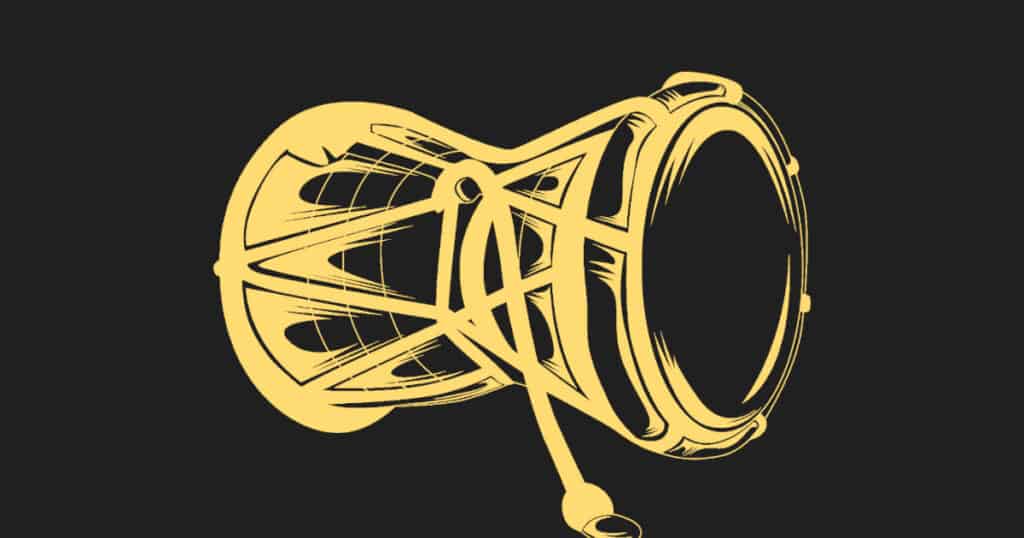The Mahabharata is a collection of hundred Parvas (or ‘sections’) that tell the story of a long-standing family feud between two sets of cousins – the Kauravas and the Pandavas – for control of the Kuru throne in Hastinapur.
The climactic event of the story is an eighteen-day war that happens between the two factions on the battlefield of Kurukshetra.
It is commonly understood that the Pandavas are the protagonists of this tale and the Kauravas the antagonists – though many retellings have appeared over the years that flip this structure.
In this post, we will summarize the Jayadratha Vimokshana Parva.
(For a full summary of the Mahabharata with all hundred Parvas, see Mahabharata Summary: All 100 Parvas Explained.)
Jayadratha Loses
In the Draupadi Harana Parva, Jayadratha abducts Draupadi and is then overtaken by Arjuna and Bhima. The two Pandavas come abreast of the Saindhava king and ask him how he thought he would get away with such a heinous act.
But Jayadratha is in no mood to talk. He tries to dodge the two Pandavas and escape into the woods, but Bhima overtakes him and wrestles him to the ground.
Arjuna is quick to warn his brother that the prince must not be killed. ‘Remember that he is the husband of Dusshala, Brother,’ he says. ‘So he is a kinsman. Let us not slay him, for it will leave our sister woebegone.’
‘Ah, mercy!’ says Bhimasena, glaring at Jayadratha. ‘Mercy, mercy, mercy! It is all Yudhishthir ever thinks of. Any Kshatriya that has committed the sin of this wretched kind is punishable by death. You know that! And yet I am asked to let him go.’
‘Let us take him back to our hermitage, Brother,’ says Arjuna. ‘We will present him to the king, and make him apologize to Draupadi.’
‘An apology is not enough!’ roars Bhima, pulling out a crescent-shaped arrow from his quiver. Using it as a blade, he shaves off Jayadratha’s head, leaving five tufts of uneven hair untouched.
‘I might not be allowed to kill you, Prince, but I sure can punish you with shame. Whenever you go out onto the streets in your native land, make sure you proclaim to the hawkers and traders that you are a slave to the Pandavas.’
Jayadratha is Spared
Chaining him to a chariot, they drag him back to the hermitage by the Trinavindu, where Yudhishthir and Draupadi – along with Nakula and Sahadeva – are waiting outside their hut. Bhima grabs Jayadratha and sends him sprawling into the dust.
A smiling Yudhishthir looks down at the vanquished prince. ‘I have no intention of taking you captive, O Jayadratha,’ he says. ‘My brothers have punished you enough. Go. You are a free man.’
Jayadratha salutes Yudhishthir and leaves the place with his head bowed. But the shame rankles in his heart. He goes on to become one of the important warriors of the Kurukshetra battle, and secures his vengeance by playing a pivotal role in the death of Abhimanyu.
He dies just before sunset on a dramatic fourteenth day, beheaded by Arjuna’s arrows.
Propitiating Shiva
After being shamed by the Pandavas in Kamyaka, Jayadratha heads northward to where the Ganga takes form, and embarks upon a life full of terrible hardships in order to please Lord Shiva.
When the god appears and grants him a boon, he asks, ‘Make me so strong, O Pashupati, that I will be able to defeat all five Pandavas during a live war.’
Shiva smiles and shakes his head. ‘The third Pandava, Arjuna, is none other than a reincarnation of Sage Nara, O Jayadratha, he who has become a legend in your world on account of all the austerities he performed while in the forest of Vadari.
‘He holds the Pashupatastra in his quiver as we speak, for I have given it to him on a previous occasion. He has also procured a number of great weapons from the gods during his time in heaven. It is quite simply impossible to vanquish him in battle.
‘And who is his friend and well-wisher! Krishna is none other than Narayana, the one we call Vishnu. In the bygone days, it is he who assumed the form of a sacrificial boar and rescued Earth from sinking to the bottom of the ocean.
‘When Bali, the Asura king, established sovereignty over the three worlds, it is he who donned the garb of a dwarf called Vamana in order to win back Indra his dominion.
‘At another time, he protected his devotee Prahlada from his father Hiranyakashyapa by becoming the Narasimha, a being that is half-man, half-lion.’
Jayadratha’s Boon
Shiva tells Jayadratha that it is impossible for anyone to vanquish Arjuna and Krishna.
‘But I will make it so that you will be able to defeat four of them – with the exception of Arjuna – over the course of one single day. On this day, you will prove to be more skilled than Yudhishthir, Bhimasena, Nakula and Sahadeva combined.
‘You will, as a result, bring about a pivotal point in the conflict between good and evil, and you will be hailed a great hero by your allies.’
This boon of Jayadratha comes true on the thirteenth day of the Kurukshetra war. With Arjuna being engaged in battling the Samshaptakas, the remaining four brothers entrust Abhimanyu with breaking into the Chakravyuha.
They plan to follow him deep into the enemy ranks. But Jayadratha blocks their progress and ensures Abhimanyu is left alone at the mercy of Drona, Ashwatthama, Kripa and others.
After securing this boon from Shiva, Jayadratha returns to his home in Sindhu, and the Pandavas continue living in the forest of Kamyaka.
With this, the Jayadratha Vimokshana Parva ends.
